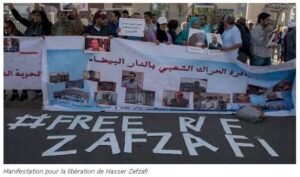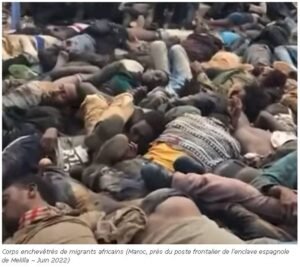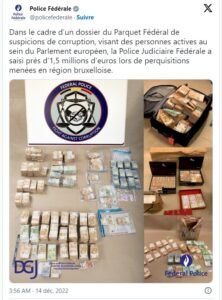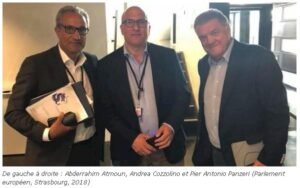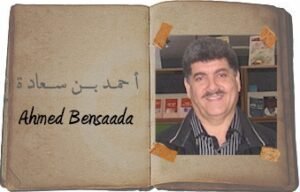
Sultana Khaya, the renowned Sahrawi activist, was left speechless upon learning that Morocco was vying for the presidency of the United Nations Human Rights Council (UNHRC). “Just that!” she must have thought, painfully recalling the events of November 15, 2021. On that day, early in the morning, dozens of undercover Moroccan security forces members forcibly entered her home, wreaking havoc. She endured a rape for an extended period, witnessing the sexual abuse perpetrated by these men against her two sisters and even her venerable 80-year-old mother [1]!
The presidency of the UNHRC! What audacity for a country deeply entangled in numerous high-profile cases, far from basic respect for human rights!
It would be very tedious to list all the sordid affairs perpetrated by the Makhzen in violation of human rights, but we will still mention some to illustrate the Kafkaesque absurdity of Morocco’s claim. And, promised, there will be no mention of Tazmamart, the infamous Moroccan prison of absolute horror [2].
A 2020 report from the U.S. Department of State (from a country that supposedly has “good” relations with the Makhzen) lists several significant human rights issues in Morocco. These include torture by security forces members, allegations of the existence of political prisoners, severe restrictions on freedom of expression, including the criminalization of defamation and criticism of the monarchy, the government’s stance on territorial integrity, and significant interference with the freedoms of assembly and association [3].
The Western Sahara
Apart from the heinous case of the collective rape of Sultana Khaya’s family, which went uninvestigated, Sahrawi activists have endured and continue to face physical abuse and degrading incarceration conditions under the “blessing” of the Makhzen, which, more than ever, shows no consideration for the legitimate claims of the Sahrawi people.
In November 2022, for instance, six new complaints from Sahrawi prisoners were filed against Morocco before the United Nations Committee Against Torture (CAT) in Geneva:
“We file complaints for acts of torture that have taken place since the arrests, so for twelve years now, which are therefore physical torture, everything one can imagine of the most terrible, beatings, threats. We received some testimonies about prisoners who were stripped naked upon arrival at the police station and suspended for hours, beaten. So a lot of physical torture acts, but also psychological torture, with isolation: for example, one of the detainees we talk about has been in isolation for five years, which is huge. They have all been transferred away from their families, access to healthcare is systematically denied, so these are long-term tortures, both physical and psychological, that continue to this day. At least the psychological violence has not stopped to this day” [4].
These complaints are just the continuation of a long list from Sahrawi political activists and human rights defenders sentenced to heavy prison terms based on confessions obtained under torture [5]. Note in this regard that the CAT had condemned Morocco in 2016 for torture against Sahrawi activist Naâma Asfari:
“The Committee notes the applicant’s [Naâma Asfari] allegation that the physical abuse he suffered during his arrest, interrogation at the police station, then at the Laayoune gendarmerie, and the treatment he received during his plane transfer to extract confessions, constitute acts of torture due to their severity” [6].
Convicted based on confessions extorted under torture, he is currently serving a 30-year prison sentence [7]!
Other equally heinous abuses have been the subject of complaints to the CAT, which had previously condemned Morocco four times. The case of activist Hassan Dah is illustrative:
On December 4, 2010, Hassan Dah, a Sahrawi human rights activist, was sipping coffee at Las Dunas in El-Ayoun, the major city of Western Sahara annexed by Morocco in 1975 when about ten hooded men burst into the establishment and took him away. In the car that took him to the police prefecture, blindfolded and handcuffed, he was violently beaten with a blunt object until he lost consciousness. He was then tortured for four days at the gendarmerie headquarters where he had been transferred. Then on a military plane to Rabat, the Moroccan capital. And finally, in the Salé prison compound.
Gendarmes burned him with cigarettes, suspended him by the knees and wrists in the “roast chicken” position, inserted a cloth soaked in urine and feces into his mouth for hours, and dunked his head in a barrel of dirty water…
Presented three months later, disfigured, before an investigating judge, Hassan Dah denounced the torture and informed the magistrate that he had signed the submitted report only under duress, without even being aware of its content. On February 16, 2013, he was sentenced to thirty years in prison by a military court for “voluntary violence leading to the death of public officials” [8].
In a report dated October 2021 and titled “The Situation in Western Sahara,” the United Nations High Commissioner for Human Rights (OHCHR) expressed concern about:
“Information about excessive restrictions on freedom of expression, peaceful assembly, and association imposed by Morocco in Western Sahara […], as well as reports of unnecessary and disproportionate use of force by Moroccan security forces to disperse protests, warrantless searches, arbitrary arrests and detentions, illegal and arbitrary surveillance measures, harassment, intimidation, and property destruction” [9].
For these reasons, the representation of the Polisario Front at the UN in Geneva deemed Morocco’s aspirations to occupy the seat of the UNHRC as “lacking seriousness, insulting to Africa, and ridiculous behavior” [10]. Additionally, they noted that in recent years, Morocco has expelled around 300 observers from about twenty countries and has incarcerated more than 40 Sahrawi political prisoners.
Rif Activists
Al-Hoceima, the capital of Rif, October 2016. Mouhcine Fikri, a street fish vendor, was crushed by a garbage truck while trying to oppose the confiscation of his merchandise. The public outcry matched the horror of the videos of the incident that flooded social media. This tragedy quickly triggered mass protests known as “Hirak,” denouncing, among other issues, economic and social oppression in the Rif region characterized by socio-economic indicators significantly lower than the kingdom’s average [11].
Following clashes between protesters and the massive security apparatus deployed in the region, 450 people were arrested [12]. Among them, the leader Nasser Zefzafi was sentenced to 20 years in prison for “conspiracy to undermine the security of the state” [13].
Nasser Zefzafi was tried in a collective trial with 52 other activists, and the verdicts pronounced were deemed tainted by suspicions of torture. Furthermore, 50 out of the 53 activists stated that they had been pressured to sign self-incriminating confessions without even reading their contents, and 21 were threatened by the police with rape on themselves, their wives, or their minor daughters [14].
For his part, Nasser Zefzafi stated in an audio recording from his prison that at the time of his arrest in June 2017, he was “beaten,” “stripped naked,” and “violated with a stick” [15]. On this last point, his lawyer provides some repugnant details revealing the perverse malice of the police involved in the case [16].
The Massacre of African Migrants
In his mission report on Morocco dated February 28, 2013, Mr. Juan E. Méndez, the United Nations Special Rapporteur on Torture and Other Cruel, Inhuman or Degrading Treatment or Punishment, mentions in the section “Migrants, Refugees, and Asylum Seekers”:
“The Special Rapporteur has received information about beatings and sexual violence suffered by sub-Saharan migrants attempting each year to reach Europe through the Strait of Gibraltar or via Ceuta and Melilla. The Special Rapporteur has gathered testimonies about the systematic abuses suffered by these migrants, who are beaten with sticks, stones, or other objects, sexually assaulted, or threatened with sexual assault and subjected to other forms of ill-treatment such as being tied up with ropes, burned with lighters, and urinated upon. He has also heard that the victims are then abandoned in ravines or forests or that they go into hiding in such places where no assistance can be provided to them” [17].
Mr. Méndez was not wrong to be concerned about the fate of migrants crossing Morocco. Indeed, the largest massacre of human lives near a European land border occurred in Morocco, near the border post of the Spanish enclave of Melilla, on June 24, 2022 [18].
According to some observers, more than 2000 sub-Saharan African migrants attempted to cross this border, which ended in a horrific bloodbath: 37 dead and 76 missing [19].
“Amateur footage of the incidents at the border, sent to InfoMigrants, shows the onslaught of violence that befell the migrants that day. It shows law enforcement officers delivering baton blows to men already on the ground, a pile of lifeless bodies lying on the ground, and the faces of suffering migrants. According to Amnesty International, migrants were reportedly sprayed with tear gas and beaten while on the ground. These accusations were echoed by the BBC or the consortium of journalists Lighthouse Reports, who denounced in investigations the brutality of the Moroccan forces, supported by videos” [20].
Two days later, on June 26, 2022, the Moroccan authorities hastily buried the deceased migrants. “Without an investigation, without an autopsy, without identification, the [Moroccan] authorities seek to conceal the catastrophe,” read the front page of the Spanish daily El País [21].
MoroccoGate
In December 2022, a seismic shock rocked the European Parliament. According to the memory of Eurodeputies, this was the biggest corruption scandal to have stained this parliamentary institution. A story worthy of a “Netflix” series: corrupt couples, bags overflowing with money, VIP vacations in dream hotels, luxury gifts, and more.
The investigation that sought to unravel the web highlighted the collusion between corrupt European MEPs and those in their orbit (former parliamentarians, assistants, and officials) with the Moroccan intelligence services (DGED – Directorate General of Studies and Documentation), which actively bribed them [22].
This is how 700,000 euros in cash were found in the Brussels apartment of Pier Antonio Panzeri (European MEP between 2004 and 2019), “officially” considered a “dear friend of Morocco” [23].
According to the revelations of the investigation, “Panzeri had too much money and didn’t know what to do with it” [24]. At least one must acknowledge this about the Makhzen: when it comes to corruption, it is very, very generous.
More than 1.5 million euros were found during several subsequent searches, and the names of numerous personalities were mentioned. Among them were Eva Kaili (Vice-President of the European Parliament), Andrea Cozzolino (European MEP), and Francesco Giorgi (partner of the first and parliamentary assistant to the second) [25]. It’s worth noting that Giorgi also worked as a parliamentary assistant to Panzeri, giving him a central role in this vast enterprise of corruption and money laundering [26].
Described by the media as an “agent of Morocco within the European Parliament” [27], Pier Antonio Panzeri was in close contact with Abderrahim Atmoun, a Moroccan diplomat, for years [28], well before the latter was appointed ambassador of Rabat to Poland [29]. According to Panzeri’s confessions, Atmoun even financed his 2014 election campaign [30]. On the other hand, when Panzeri was rejected in the 2019 election, he co-founded the front NGO “Fight Impunity” to continue his “pro-Moroccan” work. “We needed to find a clear system that wouldn’t alert the authorities,” admitted Giorgi [31]. Thus, through this “NGO,” Atmoun was transferring “suitcases of banknotes” from Morocco to reward the work of Panzeri and his gang [32].
Although Atmoun’s name is widely mentioned in many references and played a significant role in this case, he does not seem to be the mastermind behind it. Between him and the DGED leadership, another character appears: Mohamed Belahrech, alias Agent M118, known for years by European intelligence agencies and involved in numerous espionage cases [33].
According to Cléa Caulcutt and Élisa Braun [34] of Politico:
“It is now suspected that Atmoun was following orders from Belahrech, who is ‘a dangerous man.’ […] It is under Belahrech’s direction that Panzeri would have cemented his association with Moroccan DGED after failing to be re-elected to Parliament in 2019.”
Another important figure in the European Parliament was also implicated in this corruption case. This is Maria Arena, a European MEP and former president of the “famous” subcommittee on human rights (July 10, 2019 – January 11, 2023), who was forced to resign from this position after the scandal became public [35]. Note that Panzeri was also president of this subcommittee, just before Arena (January 25, 2017 – July 1, 2019). But the “friendship” between Maria Arena and Pier Antonio Panzeri is not recent. Already in 2015, Panzeri offered Arena a luxurious stay at La Mamounia, a 5-star hotel in Marrakech. In reality, the stay was paid for by the DGED through its intermediary, Abderrahim Atmoun [36]. According to notes found by the police in Francesco Giorgi’s apartment, he mentioned that Maria Arena was the “fundamental pillar of the action” [37].
The counterpart of this massive corruption operation of European MEPs lies in the defense, at all costs, of the interests of the Moroccan Makhzen, especially regarding Western Sahara, its annexation to the kingdom, and the exploitation of its resources. Not to mention demonizing opposing countries, such as Algeria.
Ana Gomes is a Portuguese European MEP (2004-2019) who knows Pier Antonio Panzeri well, and her statements regarding him are unequivocal. She asserts that he always defended the Moroccan cause on Western Sahara within the human rights subcommittee [38]:
“I always saw that he was very close to Atmoun. Panzeri frequently went to Rabat, El Ayoun, and Dakhla, always paid by Morocco. […] Panzeri has always defended Morocco’s agenda.”
In an article by Counter Currents, it is revealed that Atmoun had struck a deal with Panzeri (when he was president of the human rights subcommittee) at a time when Rabat was increasingly emphasizing its priorities with the European Union, including an agreement on fishing rights off the Moroccan coast and the status of the disputed territory of Western Sahara [39]. Pierre Galand, a former Belgian senator, is more explicit on the subject [40]:
“The Moroccans’ goal is to ensure that we never talk about Western Sahara. They want to impose the idea that Western Sahara is Moroccan, period.”
This same idea is reiterated by Belgian intelligence services [41]:
“Given the mixing of economic interests with political ones, Morocco systematically seeks to include Western Sahara in these agreements to be able to demonstrate a de facto recognition of its occupation. Obtaining support within the European apparatus is therefore of vital importance for Morocco, which strives to do so through both open (public diplomacy) and clandestine means.”
In addition to intervening personally in the subcommittee, through his NGO, or with the “help” of Maria Arena, Panzeri also helped Atmoun “endorse” other members of the European Parliament, especially those who had authority over issues that interested Rabat [42].
This was confirmed by Francesco Bastagli, the former UN special envoy for Western Sahara, who stated:
“[…] this group of friends [of Panzeri] is very articulate. They not only direct money
or resources, but they also facilitate the identification of parliamentarians who could be corrupted based on their responsibilities within the Parliament. […] They create opportunities where parliamentarians can be approached during events or visiting missions” [43].
This vast corruption operation allowed Morocco to be immune from any unfavorable resolution from the European Parliament (unlike Algeria, coincidentally!). It worked so well that this “blindness” lasted no less than 25 years [44]! But following the arrest of Panzeri and his accomplices, the Parliament was finally forced to condemn Morocco’s human rights record: a first in a quarter of a century [45]!
This led journalist Jean-Pierre Stroobants to say in January 2023 [46]:
“What is happening today in the European Parliament is very serious for the institution, democracy, especially a year before European legislative elections that could be strongly affected by this affair.”
The Pegasus Affair
All these activities of corruption, bribery, repression against political opponents (or those presumed to be), or atrocities and torture against critics of the Makhzen require sophisticated means of surveillance and espionage. This was revealed in July 2021 with the Pegasus affair.
Pegasus is a hacking spyware developed and marketed by the Israeli company NSO. This malware, which can infect mobile phones remotely, allows extracting data (messages, photos, emails, etc.), recording calls, or activating cameras and microphones [47].
As expected, Morocco is among the eleven countries that have purchased this powerful espionage tool. Among the 50,000 phones infected worldwide, Morocco alone targeted 10,000, or one-fifth of the global total [48]. It was used against human rights activists, journalists, opposition figures, politicians, diplomats, and statesmen inside and outside the kingdom. Thus, 6000 phones belonging to Algerian personalities (60% of the total!) were hacked by Morocco [49]. In France, the phone numbers of President Macron, Edouard Philippe, and fourteen French ministers were spied on by the same country [50]. In its investigation published in May 2022, The Guardian [51] states that Morocco would be behind the espionage of 200 phone numbers in Spain, including that of the Spanish Prime Minister and many of his ministers [52].
And that’s not all; Pegasus was used by Morocco against Moroccan and French journalists [53] as well as Moroccan activists [54].
Of course, Sahrawis were not spared. Aminatou Haider, a famous activist defending the rights of the Sahrawi people, fell victim to it. When asked by Deutsche Welle [55] about the illegal intrusion into her phone by the Makhzen, she confided:
“Listen, the only thing is that, for example, the camera now, they have access to the camera, to the microphone. I always hide the camera, especially in moments with my husband. That really affects personal dignity.”
It should be noted that Mrs. Haider is well aware of the Moroccan “methods” and is right to be wary, as the case of Fouad Abdelmoumni is very eloquent on this subject. Sophisticated cameras inserted into the air conditioning units of this Moroccan activist’s apartment recorded videos of his intimate life, videos that quickly ended up on the Internet after his refusal to withdraw from public debate despite threats [56].
During the investigations into the Marocgate, the Pegasus affair resurfaced. Investigators sought to determine if Morocco approached the Members of the European Parliament responsible for the European Parliament’s investigation into the Israeli espionage software. It turned out that Andrea Cozzolino (previously mentioned, a member of the Panzeri gang) had been appointed to the Parliamentary Special Committee on the Pegasus program [57]. Furthermore, this Member of the European Parliament, “in close contact with Abderrahim Atmoun” [58], was one of the channels for the DGED [59].
Fouad Abdelmoumni, whose phone was infected with Pegasus [60], made the following statement:
“These practices must stop immediately. Pegasus has been used to crush human rights activists, political opponents, journalists, lawyers. This is unacceptable […] [61].
Sophie in ‘t Veld, Dutch Member of the European Parliament, thinks:
“The gravity of the Pegasus scandal cannot be underestimated. When governments target individuals for political purposes, it goes against all democratic and legal instincts […] [62].
The fetid imposture
As explained in the introduction to this article, it would be truly tedious to list all the malpractices, abuses, torture, ill-treatment, espionage, and other injustices methodically practiced by the Makhzen regime that regularly make headlines.
But in view of these few enlightening cases that have previously made headlines, how can Morocco have the audacity to submit its candidacy for the presidency of the UN Human Rights Council? Would Morocco’s record in this area be better than that of all the countries currently members [63] of this Council? The answer is no, of course. Would it not be putting a “wolf” in the “sheepfold” of human rights? Would it not be discrediting this UN institution, which was profoundly modified in 2006 precisely to remedy this kind of situation [64]?
Let us hope that the Human Rights Council will keep wisdom and preserve honor by rejecting the fetid imposture of Morocco’s candidacy.
[1] Tarek Hafid, “Western Sahara: Moroccan police accused of rape against pro-independence militants,” Sputnik Afrique, December 4, 2021, link [2] Le Monde, “The living dead of Tazmamart: Testimony from the wife of Abraham Serfaty, a Moroccan political prisoner held since 1974,” July 27, 1991, link [3] United States Department of State, “2020 Report on Human Rights – Morocco,” link [4] RFI, “Western Sahara: new complaints of torture against Morocco filed by a collective of NGOs and lawyers,” November 9, 2022, link [5] OMCT, “Joint Statement: Gdeim Izik Prisoners: Already 10 Years of Arbitrary Detention.” November 5, 2020. Link [6] CAT, “Decision adopted by the Committee under Article 22 of the Convention, concerning communication no. 606/2014.” November 15, 2016. Link [7] Rosa Moussaoui, “Naâma Asfari, Sahrawi Political Prisoner: ‘I Fight for My Freedom and That of My Enemy.'” L’Humanité, October 22, 2021. Link [8] Madjid Zerrouky, “Collective Complaint for Torture Filed Against Morocco at the UN.” Le Monde, June 10, 2022. Link [9] Office of the United Nations High Commissioner for Human Rights, “The Situation Concerning Western Sahara.” October 1, 2021. Link [10] Onda Vasca, “Polisario Sees an ‘Insult’ in Morocco’s Aspiration to Preside Over the UN Human Rights Council.” July 6, 2023. Link [11] Agence Ecofin, “Morocco: The ‘Rebels of Al Hoceima’ or the Story of the Forgotten Ones in Rif.” June 29, 2018. Link [12] Anna Breteau, “They Revolted After the Death of a Fish Seller in Morocco: Heavy Sentences Against the Rif Protesters.” Marianne, June 27, 2018. Link [13] Jeune Afrique, “Morocco: Sentences Confirmed on Appeal for Nasser Zefzafi and Hirak Rif Activists.” April 6, 2019. Link [14] Nadia Chahed, “Morocco/Hirak: Verdicts ‘Tainted by Suspicions of Torture.'” AA, November 30, 2018. Link [15] Jeune Afrique, “Morocco: Nasser Zefzafi, Leader of ‘Hirak,’ Reiterates Being a Victim of ‘Torture.'” Published on November 2, 2019. Link [16] Abouammar Tafnout, “Alleged Rape of Zefzafi: Defense ‘Demands a Reaction from the Public Prosecutor.'” H24 Info, April 12, 2018. Link [17] Juan E. Méndez, “Report of the Special Rapporteur on Torture and Other Cruel, Inhuman, or Degrading Treatment or Punishment – Mission to Morocco.” Human Rights Council, February 28, 2013. Link [18] Lighthouse Reports, “Reconstructing the Melilla Massacre.” November 29, 2022. Link [19] Info Migrant, “One Year Later, the Melilla Tragedy Remains ‘Unpunished’.” June 23, 2023. Link [20] Ibid. [21] F. Peregil et L.J. Varo, “Morocco rushes to bury the dead of Nador.” El Pais. Image Link [22] Courrier International, “Qatargate: the thread of the investigation, from the beginning.” January 11, 2023. Link [23] Antonino Galofaro, “After Qatar, the Corruption Case in the European Parliament Widens to Morocco.” Le Temps, December 18, 2022. Link [24] Jack Parrock, “Qatargate: Suspect Interviews Leak EU Corruption Details.” DW, March 3, 2023. Link [25] Olivier Tosseri, “An Italian Connection at the Heart of Qatargate.” Les Échos, December 12, 2022. Link [26] Sandro Calderon, “Qatargate: After a Year of Investigation, Indictments But Still Many Shadows.” RTBF, December 8, 2023. Link [27] Valérie de Graffenried, “Corruption in the European Parliament: Panzeri, the Man by Whom the Scandal Arrived, Collaborates.” Le Temps, January 17, 2023. Link [28] Joël Matriche et Louis Colart, “Morocco: Over 180,000 Euros (and Benefits in Kind).” Le Soir, February 25, 2023. Link [29] InfoMédaire, “Poland: Abderrahim Atmoun Takes Office.” July 29, 2019. Link [30] Elisa Braun et Barbara Moens, “Inside Morocco’s efforts to corrupt the European Parliament.” Politico, November 28, 2023. Link [31] Thomas Moller-Nielsen, “Qatar Corruption Scandal: Stunning Testimony Highlights Sinister Role of Panzeri.” Brussels Times, December 29, 2022. Link [32] Valeurs Actuelles, “After Qatar, Morocco at the Heart of an Investigation into Corruption in the European Parliament.” December 18, 2022. Link [33] Cléa Caulcutt et Élisa Braun, “The Moroccan Spy at the Heart of the Qatar Investigation.” December 24, 2022. Link [34] Ibid. [35] Ls Soir, “Corruption in the European Parliament: Marie Arena Resigns from the Presidency of the ‘Human Rights’ Subcommittee.” January 11, 2023. Link [36] 7 sur 7, “Marie Arena, a Luxury Stay in Morocco that Raises Questions.” March 13, 2023. Link [37] Eddy Wax, Elisa Braun et Gian Volpicelli, “The Mystery of the Untouched Lawmaker at the Heart of Qatargate.” Politico, December 7, 2023. Link [38] Ana Alonso, “Former MEP Panzeri is the Head of the Scheme: He Was an Agent of Morocco.” El Independiente, December 16, 2022. Link [39] Countercurrents, “Corruption Of European Parliament Members.” November 30, 2023. Link [40] Benoît Collombat et Pauline Hofmann, “Suspicions of Corruption in the European Parliament: Behind Qatar, Morocco.” Radio France, March 10, 2023. Link [41] Ibid. [42] Elisa Braun et Barbara Moens, “Inside Morocco’s Efforts to Corrupt the European Parliament.” Politico, Op. Cit. [43] Gaël De Santis, “Investigation. Marocgate: MEPs Under the Influence of the Cherifian Kingdom.” l’Humanité, January 5, 2023. Link [44] RFI, “Press Freedom: European Parliament Resolution Targeting Morocco.” January 21, 2023. Link [45] European Parliament, “Human Rights Breaches in Brazil, Morocco, and Nagorno-Karabakh.” January 19, 2023. Link [46] RTS, “After Lecturing the Entire World, the European Parliament Must Impose Control on Itself.” January 24, 2023. Link [47] Stephanie Kirchgaessner, Paul Lewis, David Pegg, Sam Cutler, Nina Lakhani, and Michael Safi, “Revealed: Leak Uncovers Global Abuse of Cyber-Surveillance Weapon.” The Guardian, July 18, 2021. Link [48] Ahmed Bensaada, “Pegasus, RSF and the ‘Self-Proclaimed’ Journalists of the Algerian Hirak.” AhmedBensaada.com, July 26, 2021. Link [49] Ibid. [50] Ellen Salvi, “‘Pegasus Project’: Emmanuel Macron Targeted by Morocco.” Mediapart, July 20, 2021. Link [51] Stephanie Kirchgaessner and Sam Jones, “Over 200 Spanish Mobile Numbers ‘Possible Targets of Pegasus Spyware’.” The Guardian, May 3, 2022. Link [52] Damien Leloup and Sandrine Morel, “Pegasus: Spain ‘Suspends’ Its Investigation into Hacks of Its Ministers.” Le Monde, July 12, 2023. Link [53] RFI, “Pegasus: Morocco Criticized for Using Spyware, Especially Against Journalists.” July 19, 2021. Link [64] Léo Durin, “China, Cuba… The UN Human Rights Council embarrassed by cumbersome members,” La Croix, October 11, 2022, https://www.la-croix.com/Monde/Chine-Cuba-Le-Conseil-droits-lhomme-lONU-embarrasse-membres-encombrants-2022-10-11-1201237150
Source : Translated from https://www.ahmedbensaada.com/index.php?option=com_content&view=article&id=644:2024-01-03-00-09-04&catid=48:orientoccident&Itemid=120







